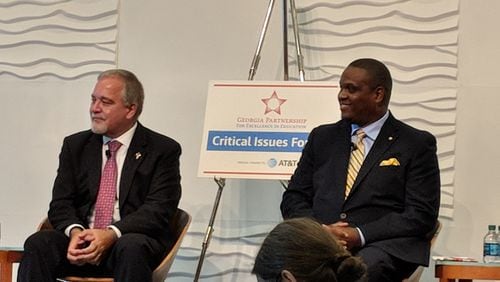The two candidates to lead the department that oversees Georgia’s 1.8 million students say they want more money for schools and for teacher pay, more classes in science, computing and art and more help for the poor.
They both say they want less high-stakes testing, and they even agree that school buses should have seat belts.
It may seem paradoxical in this era of deep political division, but policy differences between the Republican incumbent state school superintendent and his Democratic challenger are hard to find.
To be sure, Richard Woods, a former teacher and school administrator who wants another four years in office, and Otha Thornton, a former national PTA leader, have not completely avoided the partisan divide.
Woods opposes bathroom flexibility for transgender students, citing "safety and privacy concerns" when he allied himself with Georgia's 2016 lawsuit against a directive from President Barack Obama's administration. Thornton says he supports LGBTQ students or those questioning their gender, saying on Facebook last summer that "sexual identity is a fundamental aspect of who we are … ."
They also disagree on arming teachers, with Woods noting at a debate that the state leaves the decision to local school boards, “and I trust the locals to make their decision.” Thornton said he is “absolutely against arming teachers.”
Voters sifting for reasons to pick one man over the other will mostly have to rely on their different backgrounds.
They both hail from rural Georgia, but there the similarities end. Thornton, 51, graduated from Morehouse and says he is an eighth-generation Georgian. He joined the Army, earned a bronze star in Iraq, worked in the White House as a communications officer, and left the military as a lieutenant colonel. He now lives in the Savannah area and works as a military contractor. His tie to education: He was the first black, male president of the National PTA. He says he made corporate connections that helped him get resources for students, something he says he'll do as Georgia's superintendent. He comes armed with an endorsement from Arne Duncan, an education secretary under Obama. Duncan's endorsement touted Thornton's "outstanding advocacy efforts across the nation" for children in rural districts, those in poverty and those with special needs.
Woods, who is white, uses that endorsement against Thornton, saying Duncan was for high-stakes tests. Woods says that one of the first things he did after he took over the Georgia Department of Education was to send Duncan a letter lamenting the “pressure and punish” model of federal test-based school accountability.
Woods, 56, graduated from Kennesaw State University and earned a masters from Valdosta State. He says his teaching career — he taught high school for 14 years and rose through the administrative ranks — tells him what teachers need to succeed.
He said he has relied on that experience to help lawmakers pass laws that rolled back the testing mandates and introduced the possibility for alternatives to the standardized state tests. His agency wrote the state’s successful application to comply with the overhauled federal education law that succeeded the No Child Left Behind Act. His application for the Every Student Succeeds Act opened the door to an “innovative” testing program, something his department is applying for now. It also changed the way schools are graded, reducing the emphasis on tests and favoring things like art and Advanced Placement courses.
The candidates’ different paths have brought them to a similar place when it comes to public schools.
Consider this exchange about testing, when Thornton was in the unfortunate position of responding to questions after Woods at a forum this summer: When Woods said he would continue pushing to reduce the number of tests, Thornton had to follow with, "Basically, the same here as far as testing; I don't believe in high-stakes testing."
Then, at a recent Atlanta Press Club debate, they both said they supported a gubernatorial candidate's pledge to raise teacher pay by $5,000. It might have been surprising to hear a Republican backing a proposal that would significantly increase an education budget that already takes about a third of the state's $26 billion budget. But the pay proposal is from Republican candidate Brian Kemp, which meant Thornton was in the awkward position of supporting the education platform of the opponent of the woman atop his party's ticket, Democrat Stacey Abrams.
Thornton says Woods' leadership has resulted in a state that performs below average. Woods points to rising test scores and graduation rates and a $61 million federal grant for literacy won under his leadership.
None of this may really matter to most voters, though. They face a bewildering array of candidates and questions on a long ballot. Interviews with more than a dozen early voters produced only three who could identify their pick for superintendent.
Mary Head, who voted at the Dunwoody library in north DeKalb County, needed prompting: “Can you give me the names?”
After hearing the two options, she said she picked Woods, but had no answer when asked why.
Dennis King did a little better. “Is it Otha? I can’t remember,” he said as he exited the elections headquarters in central DeKalb. “I can’t remember once it gets down below secretary of state.”
Nearly all said they just voted a party line.
About the Author







